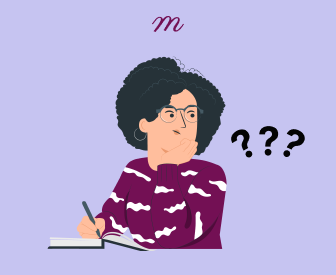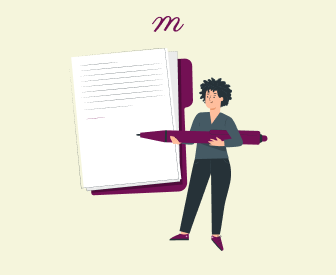Have your progress notes written for you automatically
The ABCs of Documentation for School Counselors: Notes, Forms, Templates, and More
Welcome to school counseling, where dedicated professionals tirelessly support and guide students on their educational journey. As a school counselor, your role is vital in helping students cope with challenges, develop essential life skills, and navigate through the ups and downs of adolescence. But behind every successful counseling session lies the power of documentation. Yes, paperwork may not sound glamorous or exciting, but trust us when we say it’s essential to your job as a school counselor. It’s like the unsung hero that ensures continuity of care and accountability.
In this blog post, we will delve into the realm of documentation for school counseling – exploring its importance, different types you’ll encounter along the way, best practices to make it effective and efficient, tips for maintaining confidentiality while documenting sensitive information, and even recommended templates to simplify your workflow! So please grab a cup of coffee (or tea) as we unravel the secrets behind proper documentation in school counseling.
Why Good Documentation is the Key to Successful School Counseling
As a school counselor, proper documentation of your sessions and student interactions is crucial to your job. It serves as a record of your interventions, progress made with students, and outcomes achieved. One of the essential reasons for documentation is to help school counselors maintain accountability. By keeping detailed records of their activities, counselors can demonstrate their impact on student well-being and academic success. This is especially vital when justifying resources or advocating for additional support services. Moreover, having clear documentation ensures everyone involved in a student’s care is on the same page regarding implementing goals and strategies.
Comprehensive documentation also enables school counselors to reflect on their counseling practices and make data-driven decisions. By reviewing recorded information about past interventions and techniques used with students, counselors can evaluate what has been effective and adjust their approaches accordingly. Furthermore, documentation contributes to maintaining ethical standards by ensuring client confidentiality. School counselors must protect sensitive information while providing necessary details to other stakeholders involved in a student’s care.
School Counselors Session Notes Templates
School counselors use different types of documentation to keep track of students’ progress and the interventions they provide.
The main types of documentation used in school counseling are:
Progress Notes
Progress notes play a vital role in documenting school counseling. They record essential details of every session between a counselor and a student, such as progress, challenges, goals, interventions, and plans for the next session. Progress notes may also contain observations related to mood and demeanor, assessments, and reflections on the student’s emotional well-being and academic performance. Additionally, progress notes should document any referrals or resources provided to support the student further.
Progress Note Template:
Date:
Student Name:
Start Time:
Stop Time:
Presenting Concern: Briefly summarize the student’s presenting concern or goal.
Session Summary:
- Briefly describe what occurred during the session.
- Include critical details of the discussion, students’ mood and behavior, interventions used, and responses.
- Use bullet points for clarity and conciseness.
- Limit each progress note to 3-5 bullet points.
Next Steps: Document any next steps agreed upon, including follow-up items or future appointments.
Individual Learning Plans
Individual Learning Plans (ILPs) are important documents for school counseling. They provide a framework for supporting students’ academic and personal goals, personal and social development, information on the student’s strengths, areas for improvement, and recommended interventions. By documenting these ILPs thoroughly and consistently, school counselors can monitor student’s progress and tailor their interventions to each student’s challenges or growth areas. Collaborating among school counselors, students, parents/guardians, teachers, and other stakeholders helps ensure the plan reflects each student’s unique needs and aspirations.
ILP Form Template:
Student information: Name, grade, student ID, date of ILP creation
Short-term goals: 2-3 specific, measurable goals the student wants to achieve in the next 3-6 months related to academic performance, social development, career exploration, etc.
Long-term goals: 1-2 broad goals the student wants to achieve by the end of the school year or before graduating high school.
Action steps: List the specific steps the student will take to progress toward each goal with start dates and due dates. This may include requesting tutoring support, joining a club, scheduling college visits, etc.
Resources needed: List any help, information, or materials the student requires from you, teachers, or others to achieve the goals.
Progress updates: Include boxes or lines to note the student’s progress at interim checkpoints.
Student signature: Have the student sign and date the ILP to indicate their commitment.
Parent signature: Have a parent/guardian sign and date the ILP to show their support.
Counselor signature: Sign and date the ILP to indicate your approval of the plan and commitment to support the student in achieving their goals.
Intake Forms and Notes
Intake forms are documents that collect detailed background information about new students. These forms usually include questions about the student’s family, medical history, strengths, challenges, goals, and other relevant information. On the other hand, intake notes summarize a student’s background, the reason for their referral, presenting issues, and treatment plan. These notes are usually written during the initial meeting to gather information about the students to determine the best way to help them.
Student Intake and Assessment Template:
Student Name:
Age:
Grade:
Parent/Guardian Names:
Reason for Referral:
Academic Performance:
Peer Relationships:
Home Life:
Behavioral Concerns:
Mental Health Concerns:
Strengths:
Goals (3-5):
Counselor Notes:
Follow Up Plan:
Referral Forms
School counselors must use referral forms to communicate with teachers, parents, and outside professionals about student well-being. These forms should include relevant information such as the reason for the referral, observed behaviors or concerns, and any previous interventions attempted. Referral forms assist in tracking outcomes and monitoring progress over time, promoting better collaboration among educators and mental health practitioners. They also maintain confidentiality and document the process of referring the student to external resources if necessary.
Referral Form Template:
Student Information:
Student’s initials:
Grade:
Homeroom teacher (if relevant):
Parent or guardian contact information:
Reason for Referral: A short description of why the student is being referred in the referrer’s own words.
Concerns: Checkboxes for common issues like academic difficulties, attendance problems, behavioral issues, mental health concerns, and social/emotional difficulties.
Observations: A free-response section for the referrer to describe specific behaviors they have observed in the student.
Interventions Attempted: A list of strategies or accommodations already tried by the teacher or parent to address the student’s needs.
Termination Notes
Termination notes summarize the student’s progress, achievements, and recommendations for aftercare. They bring closure to the counseling relationship and provide information for future counselors.
Termination Note Template:
Student:
Grade:
Termination date:
Reason for termination:
Summary of counseling: [Name] participated in [#] counseling sessions from [date range]. We focused on [issue 1, issue 2, etc.]. During this time, [Name] progressed with [strategies learned, coping skills developed, etc.]
Recommendations: Continued counseling, community programs, self-care strategies, etc.
Closing: I appreciate the opportunity to work with [Name]. I wish them all the best moving forward. Please feel free to contact me if you have any questions or concerns.
Best Practices for Documenting in School Counseling
Thorough and objective notes are necessary as they allow for continuity of care, enable supervision and oversight, and serve as evidence of your interventions if required. As a school counselor, you can ensure that your documentation is effective, efficient, confidential, accurate, comprehensive, and positively supports the mental health needs of your students by adhering to these best practices:
Use clear and concise language
When documenting, simple and direct language must be used to convey the information accurately. Avoid using jargon or complex terms that may confuse readers.
Focus on relevant information
When documenting, it is crucial to focus on key points and avoid including every detail. Only have information directly related to the student’s goals, progress, and any interventions used. Note their mood, affect, behavior, and any concerns they shared, and mention the strategies or advice you provided.
Maintain confidentiality
When documenting sensitive information about a student’s personal life or mental health, it is crucial to maintain confidentiality at all times. When digitizing paper notes, shred them to prevent unauthorized access. Avoid recording identifying details such as their name, address, or family information.
Date all entries
It’s important to date each entry to create a timeline of the student’s progress and track any changes over time.
Be objective and non-biased
As a counselor, it is crucial to maintain objectivity while documenting interactions with students. Avoid including personal opinions or judgments in your documentation. Use objective terms and state only observable facts about the student and the session. For instance, it’s better to say “student appeared distracted” instead of “student seemed distracted.” Additionally, document verbatim statements from the student using quotation marks.
Regularly review, reflect, and update documents
It is indispensable to review existing documentation for accuracy, update goals or strategies as needed, and identify patterns or trends to support students over multiple sessions. After the session ends, go over your notes while the details are still fresh in your mind. Make sure to add any follow-up tasks, questions for the student, or areas needing clarification.
Standardize your process:
To quickly find your notes when required, developing a consistent system for taking and organizing them is recommended. You can create a template that includes sections for the student’s presentation, discussion topics, interventions used, and plans for the next session. To keep your notes safe, store them in digital format in secure document folders sorted by the student’s initials or code name.
Creating Effective, Efficient, and Comprehensive Documentation
If school counselors prioritize their documentation practices by focusing on clarity, comprehensiveness, efficiency, and organization, they can effectively track the effectiveness of their strategies and make informed decisions about future interventions. They can streamline the process using templates or forms designed for school counseling to save time. Using simple language and avoiding jargon is essential to ensure anyone reading the documentation can easily understand it. Additionally, breaking information into digestible sections using bullet points or headings can be incredibly helpful.
During each interaction with a student, school counselors should include details about any concerns raised by the student or observations made during the session. This level of detail helps to paint a complete picture of the student’s needs and progress over time. Effective and efficient documentation relies on organization. Keeping all documents related to each student together in one place makes it easier for counselors (and other professionals) to access relevant information quickly when needed.
Tips for Maintaining Confidentiality While Documenting
School counselors have a crucial responsibility to safeguard the privacy and trust of their students. Therefore, ensuring the highest level of confidentiality while documenting is essential. A safe and secure environment where students can seek support without any fear of their personal information being disclosed is crucial in establishing a relationship of trust between students and counselors.
Here are some tips to help maintain confidentiality while documenting:
- Secure Storage: Ensure that all documentation is stored securely. Lock filing cabinets to prevent unauthorized access. Do not leave any keys out in the open.
- Password Protection: If using electronic systems for documentation, ensure your devices and software are encrypted and password protected with strong passwords that are regularly changed.
- Limited Access: Limit the number of individuals accessing confidential student records. Only share information on a need-to-know basis with other professionals involved in the student’s care.
- Proper Disposal: When disposing of confidential documents, shred them thoroughly to ensure they can’t be reconstructed or accessed by unauthorized persons.
- Professional Boundaries: Maintain professional boundaries by refraining from discussing specific cases outside a private and secure setting.
- Confidentiality Training: Stay up-to-date on laws and regulations regarding confidentiality in your jurisdiction through ongoing training and professional development opportunities.
School Counselor Notes FERPA
Under the Family Educational Rights and Privacy Act (FERPA), school counselor notes are generally considered part of a student’s educational record, thus subject to FERPA’s confidentiality requirements. These notes, if personally identifiable and maintained by the educational institution, cannot be disclosed without the written consent of the student (if 18 or older) or the parents (if the student is a minor). However, there are exceptions. For instance, if the notes are kept in the sole possession of the counselor and not shared, they might not be considered educational records and thus not covered by FERPA. Also, in cases of health and safety emergencies, FERPA allows schools to disclose information from educational records, including counselor notes, without consent. This balance aims to protect student privacy while ensuring their safety and well-being.
Additional Recommended School Counseling Notes Templates and Forms
These additional templates and forms provide a starting point for counselors to create a comprehensive and organized system for recording important information while maintaining confidentiality. It is important to note that each educational institution may have its guidelines for documentation requirements. Therefore, it is advisable to consult your school’s policies when selecting appropriate templates or creating new ones based on the recommended templates.
Crisis Response Plan:
A standardized crisis response plan template will help you respond quickly and appropriately in an emergency. The consistent format will also make reviewing and improving your response procedures easier based on how previous crises were handled.
Crisis Response Plan Template:
Student information: Name, grade, student ID, emergency contacts, medical conditions, and medications.
Details of the crisis or emergency: Date, time, location, description of the incident, injuries or damage, people involved.
Immediate response actions taken: Identify who has notified [parents, administrators, emergency services], actions to ensure safety and provide medical care, and actions to secure the location and preserve evidence.
Longer-term response plan: Discuss any counseling services arranged, class schedule changes, disciplinary actions, a communication plan for staff, students, and families, and follow-up meetings scheduled.
Revision history: dates the plan was updated and by whom.
Consent Form:
Consent forms are necessary when seeking permission from parents/guardians before providing certain services like group counseling or sharing confidential information with external agencies involved in a child’s care plan.
Consent Form Template:
The date:
Student and parent contact information:
A summary of the services being consented to: Provide information on the specific procedures or activities the student will participate in and a statement that participation is voluntary and consent can be withdrawn at any time.
School counselor name and title:
You’ll also want to include some standard language around:
Confidentiality: limits of confidentiality for students under 18
Data privacy: how information will be stored and used
Informed consent: that consent is given voluntarily with a complete understanding of risks and benefits
- For example, consent for counseling services may include, “I give permission for [student name] to participate in individual and group counseling sessions with [your Name] for the [time period]. I understand that participation is voluntary and that I may withdraw consent at any time. All information will be kept confidential except in situations that may threaten the student’s or others’ safety.”
Signature lines: Include space for the parent and student (if applicable due to age).
Conclusion:
As a school counselor, you are vital to your students’ lives. Your role is to provide them with the best care possible to achieve their goals and reach their full potential. However, this can be challenging when you’re bogged down by paperwork and documentation. That’s where Mentalyc comes in. With its user-friendly interface and pre-made templates, you can simplify the documentation process and focus on what matters – your students. By keeping organized and consistent documentation, you can track their progress, communicate with teachers and parents effectively, and ensure you meet ethical and legal obligations. Mentalyc understands the unique needs of school counselors and is designed to support your privacy, efficiency, and accountability. So, let Mentalyc be your partner in providing quality school counseling. Start your free trial today and see the difference it can make!
FAQs About Documentation for School Counselors
As a school counselor, you likely have many questions about properly documenting your sessions and student interactions. Here are some of the most frequently asked questions about school counseling documentation.
How often should I document?
It’s best practice to document each interaction with a student, whether a quick check-in or an entire counseling session. At a minimum, aim to document at least once per week for students you see regularly. The more detailed and consistent your notes are, the better equipped you’ll be to track students’ progress and have informed discussions with administrators, teachers, and parents.
What should I include in my notes?
Your notes should capture the details of your interaction with a student. Include the date and time, the student’s presentation and mood, the topics you discussed, your observations, and any next steps. Note the student’s strengths, challenges, goals, and any concerns you may have. Keep your notes factual and objective.
How long should I retain records?
Generally, you should keep student records for at least seven years after graduation or leaving school. Check your state laws and school district’s policies for the required retention period. After that time, records should be destroyed securely according to legal guidelines.
What forms and templates do I need?
Standard forms for school counselors include student contact logs, referral forms, consent forms, needs assessments, and education or career plans. You’ll also want templates for progress notes, counseling notes, and letters (to teachers, parents, and administrators). Having standardized templates will make documentation more efficient and consistent.
What are my ethical responsibilities?
Your top priority is protecting student confidentiality. Only share information with parents, teachers, and administrators on a need-to-know basis and with proper consent. Ensure all physical and digital records are kept secure and private. Documentation should be factual, objective, and helpful for supporting students’ well-being. Avoid judgmental or harmful language. Following ethical guidelines is critical to building trust and helping students.
References:
- American School Counselor Association. (n.d.). Ethical Responsibilities. https://www.schoolcounselor.org/About-School-Counseling/Ethical-Legal-Responsibilities
- American School Counselor Association. (n.d.). T mplates & Tools. https://www.schoolcounselor.org/About-School-Counseling/ASCA-National Model-for-School-Counseling-Programs/Templates-Resources
- American School Counselor Association. (n.d.). Ethics FAQs. https://www.schoolcounselor.org/Abo t-School-Counseling/Ethical-Responsibilities/FAQs
- Williams, R. (n.d.). Case Notes and Guardian Rights. American School Counselor Association. https://www.schoolcounselor.org/Magazines/January-Febr ary-2008/Case-Notes-and-Guardian-Rights
Disclaimer
All examples of mental health documentation are fictional and for informational purposes only.










